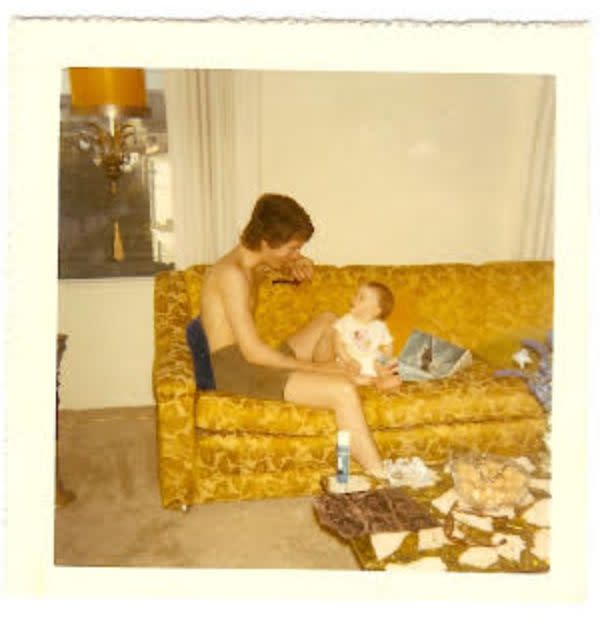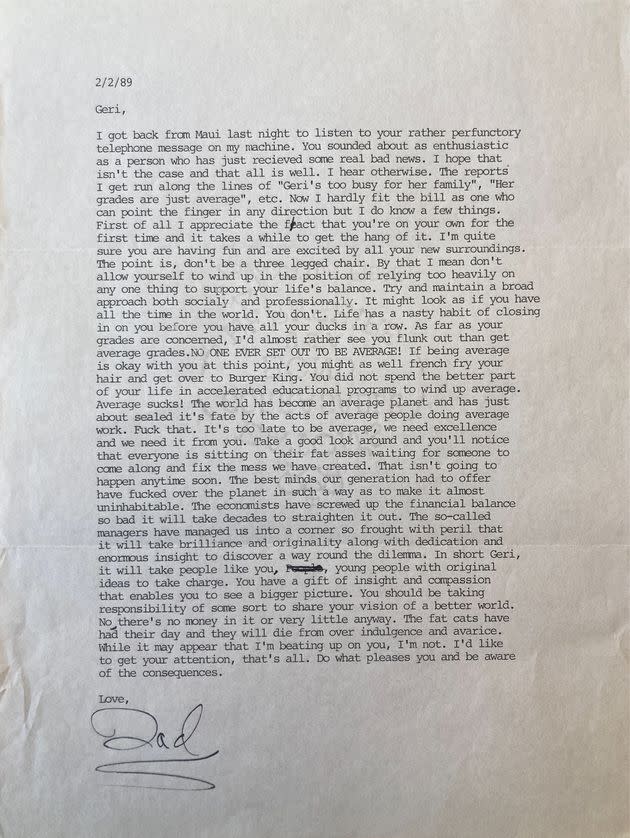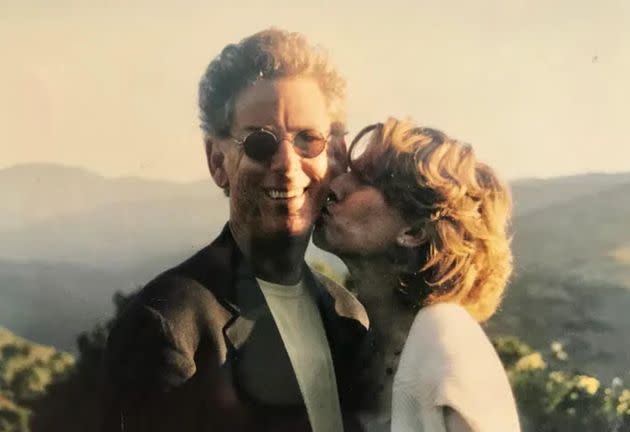My Dad Disappeared When I Was A Kid. Years Later, I Got A Letter That Changed Both Our Lives.
My father came back into my life by way of the post office.
During the summer I turned 14, I came home to a typewritten letter waiting for me on my bedspread. My dad had entered a drug treatment program — part of his rehabilitation was writing to his family about what he’d been through, and to apologize if necessary.
Apologies were necessary.
My father had disappeared five or six years before, after a custody battle and then a failure to pay child support. Since then, we’d moved away, and my mother remarried and had a second child. The few memories I had of my father were mostly of a swimming pool that made my eyes bloodshot, animals that I loved and an awful skin rash I picked up when he’d taken me to Hawaii without telling my mother.
In that first letter, he explained his addiction and the consequences it had on his life, and how when trouble descended, he’d been incapable of dealing with it, so he’d stayed loaded. Now finished with an 28-day rehab program, he planned to remain in Monterey, California — a city with a historically calming effect on him since his stint at Fort Ord when he was 18.
He closed the letter: “There will be a new twist to what I do, how I do it and who I choose to do it with. I am feeling stronger every day, but I didn’t get sick in one day and I don’t think I’ll get well in one month either. Would like to hear from you. Hope you understand.”
I was 14. I didn’t understand. But I had a father that wanted to hear from me, so I wrote back. And then he did. And then I did. For 17 years.

His letters gave me what I’d been missing during the first 14 years of my life. Every typewritten page, every piece of personal stationery with his left-handed scrawl, managed to fill another gaping hole in my heart with something like love.
When I began writing for my high school newspaper and sent him my clippings, my dad, an aspiring writer with a deep wish for a published work of his own, was over the moon with praise.
When I was 16, he wrote: “I enjoyed your articles and I think you show great promise.” At 17, a note from him arrived that read, “Another excellent piece! You have found your calling. I am impressed.”
When I was not quite 18, he wrote to me and shared that the fun of writing had left him. He explained he was trying to remember the simple joy of getting words down on the page.
“I consider you a writer,” his typewritten words on thin vellum paper proclaimed, “and any suggestions you might care to share on this or other subjects would be most welcome.”
He considered me a writer. More than anything, he considered me.
When my graduation from high school coincided with my mother’s second divorce, there was no money to spare for college tuition. My father — who’d finally begun paying my mother that back child support — offered to send it straight to me. This made going to college possible, eventually making me the first in my family to graduate with a degree from higher education.
At 19, he bought me my first car, a used 1981 Honda Prelude. He laid out the agreement in another letter: “If you are going to drink, you may not drive under any circumstances. Wearing the Dad hat is still awkward and I am falling all over myself, please try and understand. I love you and respect you, all I want to know is how we can continue to improve our relationship.”
Every letter ended the same: Much love, Dad.
I used the car to get to school and work and to fulfill the requirements for my major in journalism, the choice of which was greatly influenced by my father. Once, when I mentioned changing my major to psychology, citing my love of people and desire to help them, he countered that my gift for writing was something that would help many people — and that it was a gift not everyone had to give.
Plus, he was paying, so journalism it was.
When I got caught up with my social life in college, ending up with average (or below average) grades, a letter arrived promptly, reminding me what I was in school to do.
“If being average is OK with you at this point, you might as well french fry your hair and get over to Burger King! No one ever set out to be average!” he wrote. “The world has become an average planet and has just about sealed its fate with average people doing average work. We need excellence and we need it from you. It will take people like you — young people with original ideas — to take charge.”
Reader, my grades improved, if only slightly.
During college and after, I drove the Prelude from my apartment in Los Angeles to his house in Monterey so often, the car could almost find its way there without me. Dad, his wife Karen and I stayed up too late watching movies and, after Karen went to bed, Dad and I sat by the fireplace for hours and talked about the world, about writing, about life.
What he didn’t share fireside arrived by mail.

“It’s 2 a.m. and I feel like running. I don’t mean jogging either,” one letter read. “Sometimes, I just want to cut and run. That was my pattern. It didn’t matter if things were going well or poorly, the feeling would come over me and splitting was the only thing I could think of. I’ve simply run out of places to run so now I’m running in place.”
In another letter he wrote, “I’m wrapped in the summer fog. It’s wet and heavy and is holding me inside and away from the beach and pool. Possibly, I’ll be able to write today. This is the way it always begins.”
After college, I worked as an advertising copywriter. I was 26 and making $26,000 a year writing jingles. Yet, from my father’s letters, you’d think I’d won a Pulitzer.
“I want you to know that I am proud of you and pleased that you are becoming what I’ve only dreamed of becoming, a writer,” he wrote. “At least one of us is going to make it.”
I knew writing commercials for Subway sandwiches and Lee jeans didn’t make me special, but the words he’d sent me from his Smith-Corona did.
Like every other twenty-something, I questioned the government and policy and the world. He had thoughts on all of it. Once he fished me out of a terrible relationship in person; for almost everything else, he counseled me by snail mail and eventually, email.
“I know you are afraid,” he wrote, “which is not entirely a bad thing. A little reservation, concern, awareness and appreciation of the subtleties can add to your grace of movement and decision-making abilities. Go with your strength — writing, observing, making sense of disorder and assisting others by this very talent.”
He added, “In your search for something positive, look in the corners. The true leaders are often anonymous. You have inherited a mixed bag of blessings and bombs. Pick your spot, dig in and make your mark.”
By the time he met my now-husband, my father was already in a dark depression, yet he emerged long enough to be elated at my choice of mate. He was 57, struggling financially and trying to reinvent himself professionally. The last Christmas we spent together, December 2000, he hand-delivered what I didn’t know would be his last letter.
He wrote about a new musician he’d recently discovered — Eva Cassidy — and how she’d reminded him that some moments capture our attention in a way we never forget, like the first time you hear the crack of a bat or taste fresh crab or see a shooting star. He hoped Eva would inspire me, that she would remind me how the arts hold the power to do this for us.
Six months later, my father took his life.

After he died, everyone asked whether he had left a note. None had been found, but then I remembered: Yes, he had left a note. He’d left 48 of them.
Twenty-two years later, thanks to those letters, my father is still very much alive in my heart my life and the lives of my two children. If there comes a day I forget about his love for the Dodgers, Hunter S. Thompson or Miles Davis, if his passion for swimming in the ocean or remaining curious slips my mind, all I have to do is get out the yellow file with the 48 priceless pages on which his words remain, and I know they will bring him back to me, again and again.
Geralyn Broder Murray is a Northern California-based writer whose work has appeared in Newsweek, USA Today and Shondaland. Find her online at GeralynBMurray.com
Do you have a compelling personal story you’d like to see published on HuffPost? Find out what we’re looking for here and send us a pitch at pitch@huffpost.com.
If you or someone you know needs help, call or text 988 or chat 988lifeline.org for mental health support. Additionally, you can find local mental health and crisis resources at dontcallthepolice.com. Outside of the U.S., please visit the International Association for Suicide Prevention.

